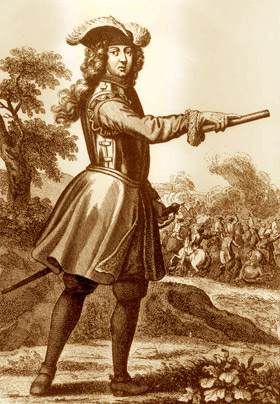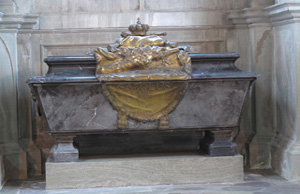|
 King Charles XII of Sweden was born on June 17, 1682, Stockholm, Sweden - died on November 30, 1718,
Fredrikshald, Norway. He was a son of Charles XI of Sweden and Ulrika Eleonora of Denmark. He was brought up in the spirit of absolutism.
Soon after his father's death on April 5, 1697 he denied regency and crowned himself as absolute monarch. Young Swedish King's military and
political inexperience encouraged Russia, Denmark and Poland-Saxony in their hopes of regaining their lost possessions in the Baltic.
An alliance between these countries was formed and Russia declared war on Sweden in 1700. This war called later as Great Northern war
quickly revealed Charles's XII ability as a gifted military commander. Very soon he succeeded in forcing Denmark to make peace and leave
alliance (1700). Then he defeated Russian army in the battle of Narva (1700), conquered Courland (1701) and invaded Poland. Later Charles
King Charles XII of Sweden was born on June 17, 1682, Stockholm, Sweden - died on November 30, 1718,
Fredrikshald, Norway. He was a son of Charles XI of Sweden and Ulrika Eleonora of Denmark. He was brought up in the spirit of absolutism.
Soon after his father's death on April 5, 1697 he denied regency and crowned himself as absolute monarch. Young Swedish King's military and
political inexperience encouraged Russia, Denmark and Poland-Saxony in their hopes of regaining their lost possessions in the Baltic.
An alliance between these countries was formed and Russia declared war on Sweden in 1700. This war called later as Great Northern war
quickly revealed Charles's XII ability as a gifted military commander. Very soon he succeeded in forcing Denmark to make peace and leave
alliance (1700). Then he defeated Russian army in the battle of Narva (1700), conquered Courland (1701) and invaded Poland. Later Charles
 XII overthrew Augustus II of Poland and Saxony and secured the election of Stanislaus Lezshinsky as a King of Poland. Since 1707 Swedish
King has been concentrated on his main enemy Russian Tzar Peter I. He secured the alliance of the Cossack leader Hetman Mazepa and
invaded Russia in 1708. By the mean time Russian army has been reorganized and well equipped with armament.
XII overthrew Augustus II of Poland and Saxony and secured the election of Stanislaus Lezshinsky as a King of Poland. Since 1707 Swedish
King has been concentrated on his main enemy Russian Tzar Peter I. He secured the alliance of the Cossack leader Hetman Mazepa and
invaded Russia in 1708. By the mean time Russian army has been reorganized and well equipped with armament.
His plans to take Moscow were not realized because of the "scorched earth" tactics implied by Russians, the
lack of food, gunpowder and of course the extremely severe winter of 1708-1709. Swedish detachment headed by General Lewenhaupt,
that was sent from Riga to the main Swedish army with provisions and ammunition was defeated by Russians near the village of Lesnaya.
Under such circumstances Charles XII took a decision to turn south into the Ukraine. His army reached Poltava in the April, 1709. On June
27, 1709, a decisive battle of the Great Northern war took place near the town of Poltava. Being defeated by superior army of Peter I and
suffering heavy losses Swedish army retreated southward to the Dnieper River. Near the village of Perevolochna Russians overtook Swedes
and forced them to surrender. About 16000 Swedish warriors were taken prisoner and then sent to Siberia. The King and a small detachment
fled into the Ottoman Empire. Soon his status of honorary guest was turned to the status of prisoner.
Being far from Sweden he administered
the affairs of the state, changed taxation policy to accumulate more money for the military purposes. Such internal policy resulted in the
impoverishment of Sweden and people's discontent increase. Charles XII was allowed to leave Ottoman Empire in late 1714, going first to
 Stralsund and returning to Sweden in 1716. By this Russia has extended Anti-Swedish
coalition by joining Brandenburg and Hannover. Even
after getting lost his Baltic provinces and possessions in Germany Swedish King still
refuse to sign peace treaty with Russia. As result, the
center of military operations was moved to Baltic. In many sea battles Russian fleet
prevailed over Swedish one. In 1716 Charles XII made
unsuccessful attempt to attack Norway. A 1716 campaign against Norway failed.
A new campaign began in 1718, when the fortress Fredrikshald was
laid in siege. On November, 30 1718, while inspecting the siege trenches, Charles
was shot in the head and died instantly. Who killed him
has remained a question for historians ever since. His body was carried to
Stockholm and after embalming buried in the
Riddarholm church
on February 26, 1719. Charles XII has left no children so he was succeeded
by his sister,
Ulrika Eleonora.
Stralsund and returning to Sweden in 1716. By this Russia has extended Anti-Swedish
coalition by joining Brandenburg and Hannover. Even
after getting lost his Baltic provinces and possessions in Germany Swedish King still
refuse to sign peace treaty with Russia. As result, the
center of military operations was moved to Baltic. In many sea battles Russian fleet
prevailed over Swedish one. In 1716 Charles XII made
unsuccessful attempt to attack Norway. A 1716 campaign against Norway failed.
A new campaign began in 1718, when the fortress Fredrikshald was
laid in siege. On November, 30 1718, while inspecting the siege trenches, Charles
was shot in the head and died instantly. Who killed him
has remained a question for historians ever since. His body was carried to
Stockholm and after embalming buried in the
Riddarholm church
on February 26, 1719. Charles XII has left no children so he was succeeded
by his sister,
Ulrika Eleonora.
She wished for her consort Landgrave Frederick I of
Hesse-Kassel to become her co-monarch but this was not permitted
by the Riksdag. On 29 February 1720, after having again been denied
a co-monarchy, Ulrika Eleonora abdicated in favour of her consort Frederick
who succeeded her as a King
Frederick I of Sweden on
24 March 1720. Under the King Frederick I, Sweden had to cede Estonia, Ingria
and Livonia to Russia in the Treaty of Nystad (1721) that
put an end to the Great Northern war.
|
 History
History
 Dates and events
Dates and events
 Persons
Persons
 Poltava
Poltava
 Sights
Sights
 Photo gallery
Photo gallery
 Maps
Maps
 Virtual Museum
Virtual Museum
 Armament
Armament
 Uniforms
Uniforms
 Coins and medals
Coins and medals
 Flags
Flags
 Paintings
Paintings
 Poltava photographs
Poltava photographs
 News
News
 About us
About us
 Acknowledgments
Acknowledgments
 Main page
Main page
 top
top ...back
...back  History
History
 Dates and events
Dates and events
 Persons
Persons
 Poltava
Poltava
 Sights
Sights
 Photo gallery
Photo gallery
 Maps
Maps
 Virtual Museum
Virtual Museum
 Armament
Armament
 Uniforms
Uniforms
 Coins and medals
Coins and medals
 Flags
Flags
 Paintings
Paintings
 Poltava photographs
Poltava photographs
 News
News
 About us
About us
 Acknowledgments
Acknowledgments
 Main page
Main page